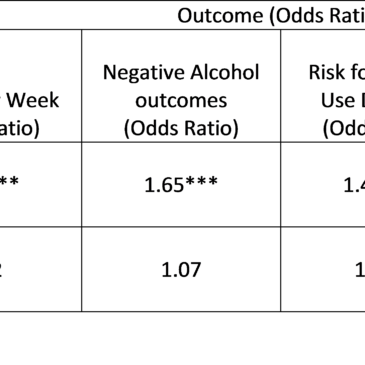Social networking and alcohol both play large roles in undergraduate life. People often use social media sites like Facebook to promote a certain self-image and connect to their friends. Posting alcohol-related content has been linked in the literature to risky drinking behaviors (Ridout et al., 2012), but it is unclear whether friends’ alcohol-related posts also influence drinking behaviors, and how the association between alcohol-related posts and behaviors relates to specific drinking motives, such as enhancement or conformity. This week, as part of a Special Series on Addiction and Technology, The DRAM reviews a study that tested whether certain patterns of Facebook use among college students relate to drinking motives, and whether those Facebook patterns can predict risky drinking outcomes above and beyond drinking motives (Westgate et al., 2014).
Methods
- Researchers administered a series of questionnaires to 1,106 college students (40.6% M, 20.4 years old) about their drinking behavior and their motives for drinking. These included:
- Drinking Motives Questionnaire (Cooper, 1994), which asks about social, enhancement, conformity, and coping motives;
- Daily Drinking Questionnaire (Collins et al, 1985), which assesses weekly alcohol consumption;
- Rutgers Alcohol Problem Index (RAPI; White & Labouvie, 1989), which asks about negative outcomes of drinking;
- The AUDIT (Babor et al., 2001), which identifies individuals at risk for developing alcohol use disorders; and
- Alcohol Craving Questionnaire Short Form Revised (ACQ; Singleton, 1995), which asks about drinking behaviors and cravings
- Students also reported frequency (from “never” to “daily”) of their own and their friends’ activity on Facebook pertaining to alcohol-related posts. Researchers empirically classified their answers into two constructs:
- “Facebook self”—how often respondents post pictures and mentions about alcohol and how often others post pictures of respondents drinking alcohol on Facebook;
- “Facebook friend”—how often respondents’ friends post pictures of themselves drinking and mentions of alcohol on Facebook.
- Researchers ran a series of regression analyses predicting alcohol use outcomes from “Facebook self” and “Facebook other” alcohol-related posts. They controlled for number of Facebook friends, gender, and drinking motives.
Results
- Both “Facebook self” and “Facebook friend” alcohol-related posts were positively associated with social, enhancement, conformity, and coping drinking motives; these associations were strongest for social and enhancement motives.
- “Facebook self” uniquely predicted all four alcohol outcomes (i.e., drinks per week, negative drinking outcomes, risk for alcohol use disorder, and alcohol cravings).
- “Facebook friend” uniquely predicted risk for alcohol use disorder, but did not account for unique variance in drinks per week, negative drinking outcomes, or alcohol cravings.

Figure. Regression of Alcohol-Related Outcomes on Alcohol-Related Facebook posts (adapted from Westgate et al., 2014). Click to enlarge.
Note. All models controlled for drinking motives, gender, and number of Facebook friends. Regression analyses for drinks per week, negative alcohol outcomes, and risk for alcohol use disorder used a negative binomial model because of the non-normal distribution of these outcomes.
***p < .001; **p<.01; *p<.05
Limitations
- Researchers did not have direct access to students’ Facebook profiles, so they had to rely on self-report. Self-report data are always subject to inaccuracy and bias.
- The posts themselves could be about outcomes, which would explain why posts are highly correlated with outcomes. For example, people who experience negative outcomes might post about those outcomes on Facebook (e.g., “Soooo hung over right now…I think I’ll sleep until dinnertime”), which would provide a more straightforward explanation of the strength of the relationship between posts and outcomes.
Discussion
The study findings indicate that alcohol-related Facebook posts are related to drinking motives in specific ways. In particular, students who reported drinking for social or self-enhancement reasons also reported more alcohol-related posting activity, suggesting that their Facebook activity might serve to fulfill these motives. The results of the regression analyses suggest that even when factors such as gender, size of friend group, and drinking motives are controlled, alcohol-related Facebook postings relate to alcohol outcomes. As noted in the limitations, it could be that alcohol-related posts and negative alcohol outcomes are highly correlated because they are reporting on the same behaviors. The researchers were unable to account for this in the current design because they were blind to the content of the Facebook posts. Future research could look more closely at the content of alcohol-related posts, to see which types of posts predict different kinds of alcohol-related outcomes.
– Sarah Nelson and Kat Belkin
What do you think? Please use the comment link below to provide feedback on this article.
References
Babor, T., Higgins-Biddle, J. C., Saunders, J. B., & Monteiro, M. G. (2001). The Alcohol Use Disorders Identification Test: Guidelines for primary care (2nd ed.) Geneva, Switzerland: World Health Organization, Department of Mental Health and Substance Dependence.
Collins, R. L., Parks, G. A., & Marlatt, G. A. (1985). Social determinants of alcohol consumption: The effects of social interaction and model status on the self-administration of alcohol. Journal of Consulting and Clinical Psychology, 53, 189-200.
Cooper, M. L. (1994). Motivations for alcohol use among adolescents: Development and validation of a four-factor model. Psychological Assessment, 6, 117-128. Cooper, 1994
Ridout, B., Campbell, A., & Ellis, L. (2012). ‘Off your Face(book)’: Alcohol in online social identity construction and its relation to problem drinking in university students. Drug and Alcohol Review, 31, 20-26.
Singleton, E. G., Tiffany, S. T., & Henningfield, J. E. (1995). Development and validation of a new questionnaire to assess craving for alcohol. Problems of Drug Dependence, 1994: Proceedings of the 56th Annual Meeting, the College on Problems of Drug Dependence, Inc., Volume II: Abstracts. NIDA Research Monograph 153 (p. 289). Rockville, MD: National Institute on Drug Abuse.
Westgate, E.C., Neighbors, C., Heppner, H., Jahn, S., Lindgren, K.P. (2014). “I will take a shot for every ‘like’ I get on this status’: Posting alcohol-related Facebook content is linked to drinking outcomes. Journal of Studies on Alcohol and Drugs, 75(3).
White, H. R., & Labouvie, E. W. (1989). Towards the assessment of adolescent problem drinking. Journal of Studies on Alcohol, 50, 30-37.




